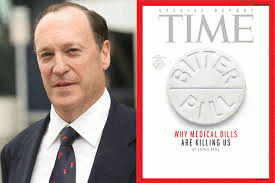Re-printed with the permission of Columbia Journalism Review where this article originally appeared on June 11, 2013
An interview with Steven Brill about reactions to his groundbreaking Time article* about the forces behind the high cost of healthcare
Steven Brill, the journalist, entrepreneur, and founder of the Yale Journalism Initiative, shook up the healthcare establishment last March with his 36-page expose, "Bitter Pill: Why Medical Bills are Killing Us," published in Time . The piece, which closely examined the reasons that US healthcare costs so much, has reverberated far and wide. Recently I sat down with Brill to talk about the reaction to his story, the state of healthcare journalism, and where the discussions about our healthcare system should go.
Trudy Lieberman: What has been the journalistic reaction to "Bitter
Pill?"
Steven Brill: It's been a mix of sour grapes and praise. Some reporters
wrote that this is a creative and new way to look at an old problem, and others
wrote articles saying there's nothing new here. A reporter from the
Springfield, MO, News-Leader , Sarah Okeson,
challenged me on a number and she was right; I had multiplied a profit margin
incorrectly. So I asked Time to run a correction. I really respected the way
she asked the question and did the work.
TL: What reaction did you get from the hospitals?
SB: Not much. Their response has been muted. The American Hospital Association did a hilarious Web page.
An association of hospital finance administrators said they had been working
for years to eliminate the chargemaster [an internal price list for medical
services kept by hospitals, which Brill characterized as a list of extremely
high prices "devoid of any calculation to cost." ]
TL: And what has been the public's reaction?
SB: The public's reaction was not like anything I have seen in response to
something I have written. People are really interested in this. I get 30 emails
a day from the public.
TL: If the public appears to be interested in healthcare costs,
judging from the reaction you've had, why do journalists have such a tough time
interesting editors in health policy stories especially those dealing with
costs?
SB: There's a thinking that some people don't care about healthcare costs.
That's increasingly untrue. People really do care, because with co-pays and
deductibles rising they increasingly have to pay for it themselves.
TL: How did the doctors react?
SB: Of all the problems in healthcare, the fact that doctors' salaries are
pretty high--though they are maybe half the salaries of decently successfully
lawyers--is not high on my hit parade. What doctors do takes brainpower, and
they should be paid for it. The fundraising director at Sloan-Kettering makes
two or three times as much as the average doctor.
TL: If journalists haven't done this story in such a comprehensive
way, why is that?
SB: They are given assignments to produce every day. They are on a
treadmill and don't have the time to spend all day deciphering CPT codes like I
did. Or at least that is what they'll tell you.
TL: In other words, what you did is hard work.
SB: It's a ton of work. Most journalists feel intimidated by codes and
documents and language they don't understand. If I have one strength, it's that
I don't get intimidated. For me getting a 48-page bill from MD Anderson [the
Houston cancer center] that was unintelligible was like being in heaven. There
was all this stuff to unravel.
TL: How is healthcare being covered, generally?
SB: Often, because healthcare reporters cover a beat, they can't find
stories that are hidden in plain sight. As a general matter, beat reporters
take the state of play as it is. They get caught up in the prevailing debate
and the four corners of the system rather than looking beyond it.
TL: Can you give an example of what they miss?
SB: All the debate on Obamacare was about who should pay for the high cost
of healthcare, not about the more fundamental issue: Why does it cost so much?
Reporters, like the policy makers they were covering, simply accepted the
ridiculously high cost as a fact.
TL: When you were an editor, how did you encourage reporters?
SB: I pushed reporters not to take stories on the terms they were given.
Always to ask more fundamental questions. Always to stretch further. Otherwise,
why bother being a reporter?
TL: How do we break through the healthcare narrative reporters keep
passing along?
SB: You should scramble beats. Change reporters every two years so they
don't become part of the process.
TL: Does the failure to do that explain why we keep seeing the same sources quoted over and over, with little new thinking brought into the story?SB: That explains a big part of it. Really, who needs to hear Peter Orzag yet again talk about how fee for service drives up healthcare costs?
TL: What's a good hospital story a reporter should dive into?
SB: If I'm a reporter in any city and covering healthcare, why haven't I
gotten a hold of the hospital chargemaster and written about it? Why haven't I
looked at the probably oppressive non-compete contracts they force on their
doctors? There are all these great stories out there".
(Note: You can view every article as one long page if you sign up as an Advocate Member, or higher).





